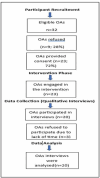Qualitative exploration of the acceptability of a 12-week intervention to reduce sedentary behaviour among ethnically diverse older adults
- PMID: 40389322
- PMCID: PMC12090861
- DOI: 10.1136/bmjopen-2024-090384
Qualitative exploration of the acceptability of a 12-week intervention to reduce sedentary behaviour among ethnically diverse older adults
Abstract
Objective: The population of ethnically diverse older adults (OAs) is increasing in the UK; this group faces complex health challenges that are exacerbated by language difficulties, socioeconomic status and acculturation experiences. Moreover, this diverse group is the least active and sedentary subgroup within the wider population, which raises a major concern for their health and highlights the need for effective behaviour change interventions to motivate this group to be less sedentary. Therefore, this study aims to explore the acceptability of a 12-week intervention to reduce sedentary behaviour (SB) for ethnically diverse sedentary OAs.
Design: The study employed a qualitative approach to assess the acceptability of the 12-week single-arm intervention for reducing SB.
Setting: The study participants were recruited on a rolling basis from January to May 2024. The recruitment process was conducted through social community organisations and local religious groups in Swansea that provided leisure, sports and recreational activities for ethnically diverse OAs.
Participants: The target population for this study was ethnically diverse OAs aged ≥65 years (including women and men) among (n=20) OAs using in-depth interviews.
Intervention: The intervention consisted of a 40-60 minute personalised one-to-one in-person health coaching session, a wearable activity tracker to remind participants to take breaks from prolonged sitting time, a pamphlet and weekly reminder messages via a mobile phone.
Primary outcome: To assess the acceptability of the intervention.
Results: Reflexive thematic analysis was performed using a deductive approach by integrating four predetermined MRC framework themes. Four overarching themes were included in our analysis: (1) acceptability, (2) usability, (3) functionality and (4) recruitment and retention. OAs were satisfied with the intervention and found it effective and acceptable. The multicomponent intervention provided users with strategies to achieve the goal of reducing their sitting time and provided them with opportunities to be active and independent. In addition, there were personal (eg, health) and social (eg, family) factors that influenced their decision to participate in the intervention.
Conclusion: The findings of this study support the acceptability of the intervention with an ethnically diverse group of OAs. Initial evidence also suggests that the intervention has the potential to increase activity and minimise sitting time in ethnically diverse OAs and therefore will inform a future effectiveness trial. The inclusion of an ethnically diverse population in this study has helped us to understand the needs and challenges of these groups to identify how to design culturally sensitive interventions that are tailored according to their needs. These insights will be incorporated into the planned effectiveness trial.
Keywords: Aged; Health; Primary Prevention.
© Author(s) (or their employer(s)) 2025. Re-use permitted under CC BY. Published by BMJ Group.
Conflict of interest statement
Competing interests: None declared.
Figures
Similar articles
-
How to improve the transferability of a 12-week home-space sedentary behaviour intervention for ethnically diverse older adults: a qualitative study protocol of key stakeholder perspectives.BMJ Open. 2025 Apr 17;15(4):e091049. doi: 10.1136/bmjopen-2024-091049. BMJ Open. 2025. PMID: 40250877 Free PMC article.
-
A multi-method feasibility trial of a multi-component behaviour change intervention to reduce sedentary behaviour and increase physical activity among ethnically diverse older adults.BMJ Open. 2024 Nov 7;14(11):e084645. doi: 10.1136/bmjopen-2024-084645. BMJ Open. 2024. PMID: 39510783 Free PMC article.
-
Acceptability of a theory-based sedentary behaviour reduction intervention for older adults ('On Your Feet to Earn Your Seat').BMC Public Health. 2015 Jul 2;15:606. doi: 10.1186/s12889-015-1921-0. BMC Public Health. 2015. PMID: 26135402 Free PMC article.
-
Using the Staircase Approach to increase movement: a systematic search and review to inform a novel sedentary behaviour intervention for older adults.Health Promot Chronic Dis Prev Can. 2025 Feb;45(2):63-75. doi: 10.24095/hpcdp.45.2.01. Health Promot Chronic Dis Prev Can. 2025. PMID: 39937696 Free PMC article.
-
Perceptions of the acceptability and feasibility of reducing occupational sitting: review and thematic synthesis.Int J Behav Nutr Phys Act. 2018 Sep 18;15(1):90. doi: 10.1186/s12966-018-0718-9. Int J Behav Nutr Phys Act. 2018. PMID: 30227861 Free PMC article. Review.
References
-
- Compernolle S, Cardon G, van der Ploeg HP, et al. Engagement, acceptability, usability, and preliminary efficacy of a self-monitoring mobile health intervention to reduce sedentary behavior in belgian older adults: mixed methods study. JMIR Mhealth Uhealth. 2020;8:e18653. doi: 10.2196/18653. - DOI - PMC - PubMed
-
- World Health Organization Decade of healthy ageing 2020–2030, Geneva, Switzerland. 2019. https://www.hoint/docs/default-source/decade-of-healthy-ageing/final-dec... Available.
-
- Mcgowan L. Developing an intervention to reduce sedentary behaviour in older adults: The University of Manchester (United Kingdom) 2020.
MeSH terms
LinkOut - more resources
Full Text Sources
Medical

